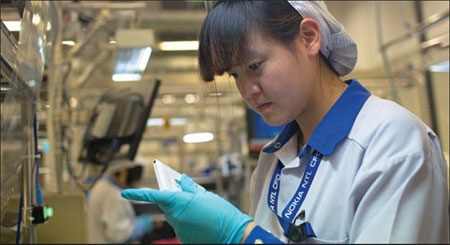

|
 Nokia has established a complete industry chain for mobile phones in Yizhuang. Provided to China Daily
|
Yizhuang telecom base becomes vital cog in Nokia's global ambitions
Lines and lines of shuttle buses are parked in front of the Beijing Economic and Technological Development Area (BDA) in the Yizhuang region of southeast Beijing, that also houses the sprawling China campus of Finnish telecom major Nokia.
The 750,000 sq m industrial cluster that makes up the BDA is a veritable hub for telecom terminal manufacture and employs more than 30,000 people. Not surprisingly, most of them are either Nokia employees or are those who work for companies, which are largely reliant on business from the Finnish company.
"You cannot imagine how bad the situation was in Yizhuang some 10 years ago," says Peng Jing, general manger of Nokia Telecommunications Ltd. Nokia was the first multinational company that set up shop in the BDA, says Peng, who joined the company in 1996 and helped spearhead construction at the BDA from 1999.
"Ten years back, before we broke ground, the area was a fish pond and had very few visitors," Peng says, adding that he cannot forget the first day as his trousers were constantly splattered with muddy water on what was a rainy day.
But much water has since then flown under the bridge, Peng says. Yizhuang is today a vital cog in Nokia's research and development endeavors and one of the few centers that has more than 1,000 dedicated R&D personnel. Last April, Nokia decided to make the Yizhuang campus its global innovation hub for the future.
The Beijing moves came at a time when the Finnish mobile giant was floundering and losing considerable market share to others in a highly competitive market. To salvage its position, the company teamed up with Microsoft Corp in February 2011 to jointly develop Nokia smartphones that could operate on the Windows Phone platform. Yizhuang has been chosen as one of the four principal global hubs for innovation in the Nokia Windows Phone handsets.
"In addition to the development of Windows Phone products, the Yizhuang center will also continue to do R&D work on other Nokia phones also," says Flann Gao, Nokia China's communication manager. He points out that the center is the only place in all of Nokia's other facilities spread across the world to have a combined function.
Apart from R&D, Nokia has also been putting constant efforts to build up a complete industry chain for mobile phones in Yizhuang. The facilities at the BDA range from design, production to logistics, and include all the critical parts that are necessary for a successful handset business.
More importantly, though Nokia will continue to make adjustments to its global handset businesses according to the market needs, much of its core strategy to become a competitive smartphone player will be driven by the BDA center, says Markus Alitalo, who heads the Windows Phone R&D department in Beijing.
One of the reasons why Nokia seems to be more than keen to put most its eggs in the China basket could also be part of its strategy to make further inroads in what is essentially the world's biggest mobile market. By the end of February, China had nearly 1 billion mobile phone users, of which 143.6 million were 3G service subscribers or smartphone users.
According to a report issued by Beijing-based research firm Analysys International, China is expected to have more than 300 million 3G users by the end of 2012. The anticipated surge in 3G user numbers is expected to result in huge opportunities for big handset makers like Nokia, experts say.
"Since most of our component suppliers are located next door, the Yizhuang base is a convenient location for us to collect parts, assemble handsets and deliver them to Chinese customers as soon as possible," Alitalo says.
China is the biggest single country market for Nokia, accounting for net sales of more than 5 billion euros ($6.6 billion) in 2011, according to its annual report.
The huge talent pool in Beijing is also another reason for Nokia to put in more efforts at the BDA. "Beijing has the most elite universities across China and we are excited to have them working in Nokia," Alitalo says.
"Though we are based in Beijing, we develop Nokia Windows Phones for customers around the world," Alitalo adds.
Edward Li, a product manager at Nokia's Windows Phone unit, says some ideas, which were originated from China, have been utilized in the global market with considerable success.
He cites the example of Chinese people preferring bigger screen mobiles whereas in the US and Europe it was more of smaller screens. "When Nokia started making bigger-size screen phones globally, we found that it caught on in other markets also", Li says.
"The Chinese market has more or less changed the way Nokia does its business. Earlier it was the European or North American market that set the trend for the entire mobile industry. But now, China is slowly exerting a bigger influence on the industry," he says.
The Lumia 800 is the latest Nokia Windows phone co-developed in Beijing. The handset, marking Nokia's first collaboration with Microsoft and the Windows Phone 7 operating system, sold about 1 million units in the final quarter of 2011. Analysts expect Nokia to ship more than 37 million Windows Phone handsets this year and there is every chance that most of them will have a Yizhuang connection.
shenjingting@chinadaily.com.cn